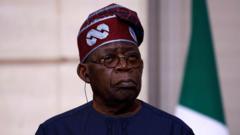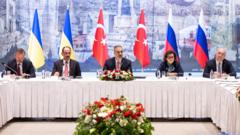The recent political upheaval in Bangladesh has created an environment conducive to the rise of Islamist extremism, with groups pushing for an Islamic governance model and promoting fundamentalist values.
Bangladesh's Political Shift Sparks Rise of Islamist Extremism

Bangladesh's Political Shift Sparks Rise of Islamist Extremism
As Bangladesh undergoes political transformation, the resurgence of hard-line Islamist groups raises concerns about the nation’s secular foundations.
In the wake of a tumultuous political climate following the ousting of the authoritarian regime in Bangladesh, a wave of religious conservatism is surfacing that threatens the nation’s secular traditions. With a population of 175 million, a significant shift is being observed as Islamist fundamentalists seize the opportunity to reshape the country's future.
Reports from Taraganj and Dhaka indicate that extremist factions are beginning to impose their ideologies on the broader populace. Recent incidents included a declaration that young women would no longer be allowed to participate in soccer, and public harassment against those who do not adhere to conservative dress codes went unpunished, with perpetrators celebrated by their communities.
The atmosphere is increasingly charged as radical voices call for severe punishments for perceived disrespect towards Islam. In a recent rally in the capital, Dhaka, protesters demanded the government enforce the death penalty for such offenses, vowing to take matters into their own hands if their demands were not met. An outlawed Islamist group further demonstrated their ambitions by organizing a significant march advocating for the establishment of an Islamic caliphate in the country.
As the nation approaches a pivotal moment in its democratic process, Islamist parties—some of which had faced bans—are burgeoning, openly discussing their aims to construct an "Islamic government." Their rhetoric emphasizes the need for a system that punishes acts deemed disrespectful to Islam and advocates for a redefined concept of "modesty."
A crucial development in this climate is the ongoing drafting of a new Constitution by officials across various political factions. There is a growing consensus that secularism, long a cornerstone of Bangladeshi identity, may be replaced with a more pluralistic framework that aligns with religious principles, marking a substantial shift in the nation’s foundational beliefs.





















